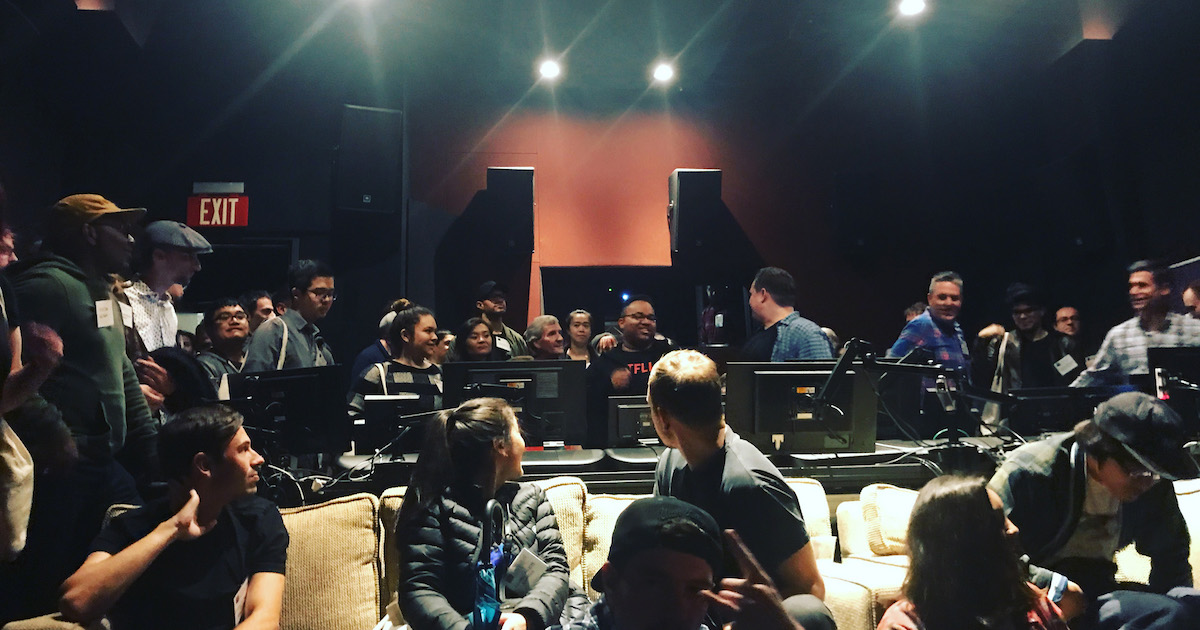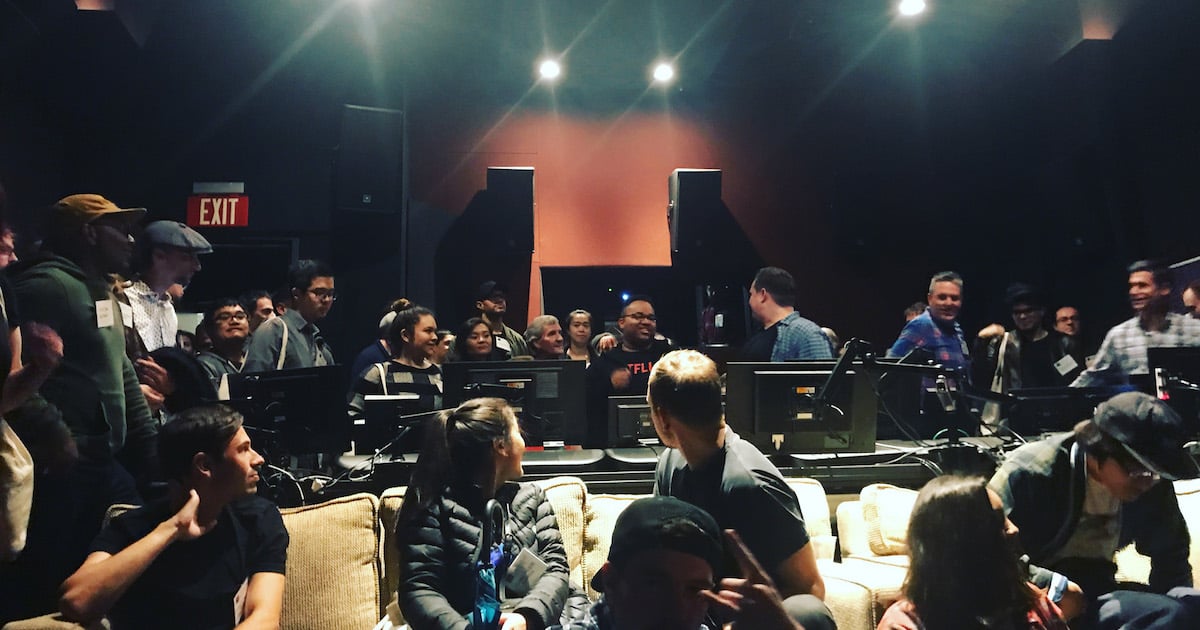 Learn the best ways to build relationships with fellow sound artists and jump-start your career in post sound.
Learn the best ways to build relationships with fellow sound artists and jump-start your career in post sound.
Working as a sound artist can be a tough path to choose. There are very few salaried full-time jobs to be had in this industry. We are all freelancers and always need to be lining up the next project.
To a large degree, the old adage "it's not what you know, but who you know," really is true when it comes to the film industry. As such, it’s important to always be making new connections.
Here are 5 surefire ways to meet fellow professionals and land your next gig:
1. Attend a film festival
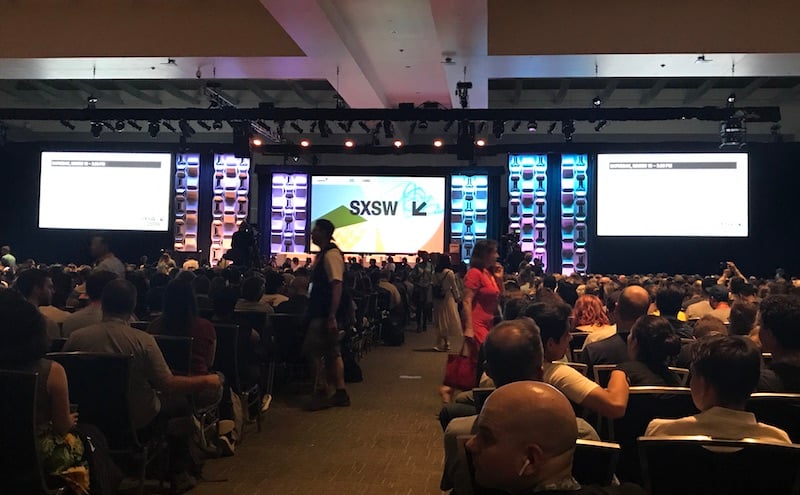
Panel discussion at SXSW Film Festival
In my personal experience, filmmaker meetups and festival parties are the best places to network. Everyone that goes to that type of event are there to meet people, so you can walk into a room and know that (almost) everyone there is wanting to network and are somehow related to the film industry. When going to these events, strike up a conversation with as many people as possible. Find out why they are at the festival, and tell them about what kind of work you do – especially if anything you worked on is screening at the festival. If you have a positive interaction with someone, make sure to either swap business cards or connect on social media.
Pro Tip: Social media can be a great way to find out what un-official events are going on during a festival. #SXSW2020 or #SXSWFilm might tune you into companies or industry organizations that are hosting special meetups or events during the festival. Social media can also be a great way to see what other audio professionals or filmmakers you would like to connect with to see if they’re in town and interested in meeting up.
If your city doesn’t have it’s own film festival, planning a trip to attend a festival elsewhere can work to the same effect, especially if a film you worked on will be playing at the festival.
2. Join a local film society
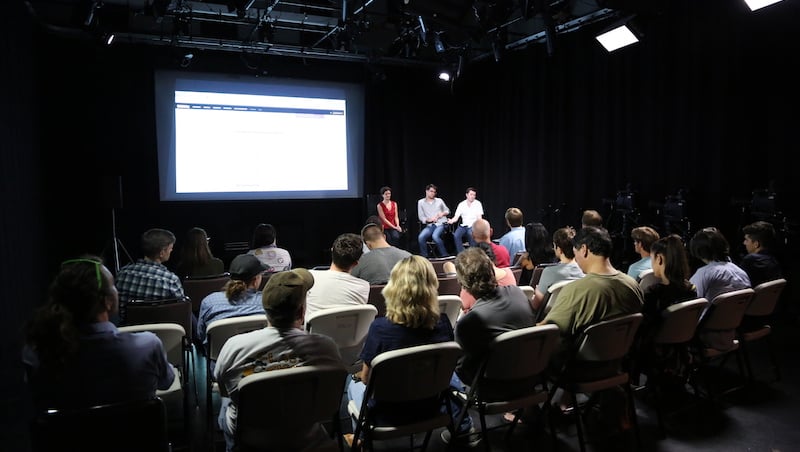 Austin Film Society event at Austin Public
Austin Film Society event at Austin Public
While festivals only happen once a year, many cities with active film communities will have a film society or organization you can join. In Austin, we are super lucky to have the Austin Film Society. Beyond having a fantastic arthouse cinema with a healthy rotation of great films throughout the year, AFS can be a great resource for filmmakers. Member-only special events and work-in-progress screenings can be a great way to interact with local filmmakers in a small group setting.
The same rules of engagement from the aforementioned festival networking all apply. Strike up a conversation with the people around you. Tell them about the work you are currently doing that excites you. Exchange information if you have a great interaction. For the work-in-progress screenings, make sure you are listening critically with your sound artist hat on. If you hear a soundtrack that still needs a lot of work, or heard something you really liked, make a point to go talk to the filmmaker after the screening. Have an intelligent conversation about sound.
While I never advocate for asking for a job at a social event, it never hurts to ask the filmmaker if they currently have a sound team helping them out with the film. If you can show you are interested in the project, can bring something to the table sonically, and they happen to be on the hunt for a sound team, this might amount to being in the right place at the right time.
3. Join a professional organization, like M.P.S.E. or C.A.S.
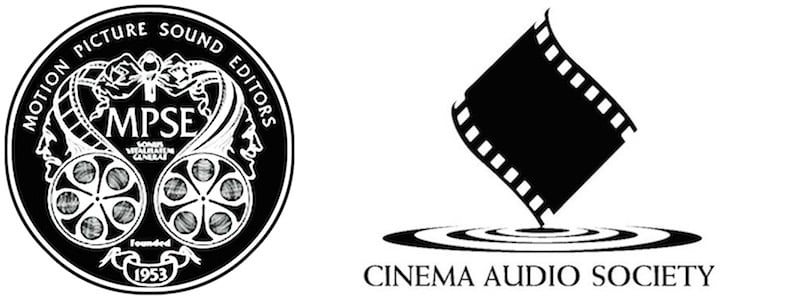
One of the challenges of being a sound artist working outside of Hollywood is that it can sometimes feel like we are on an island. To make sure we are at the top of our game, it is important to stay in tune with what the major studios are doing.
For me personally, this meant joining the Motion Picture Sound Editors (M.P.S.E.). This is the premiere organization for anyone working professionally as a sound editor, sound designer, foley artist, or supervising sound editor. The other organization you should consider joining is the Cinema Audio Society (C.A.S.), which focuses more on mixing (production sound mixers, foley mixers, adr mixers, re-recording mixers). While I also do a good deal of mixing, I tend to do more work as a sound editor and supervisor, so M.P.S.E. was the more immediate choice for me. My fellow editor and mixer, Glenn Eanes, is also based out of Austin, but gravitates more towards the roles of Foley and Re-Recording Mixer, so in turn decided to join the Cinema Audio Society (C.A.S.). Some professionals we know have also joined both. Glenn and I both joined as active members, but for anyone without the requisite credits for active membership can also join as an associate member. Both organizations also have student memberships for anyone still in school.
So why join an organization like M.P.S.E. or C.A.S.?
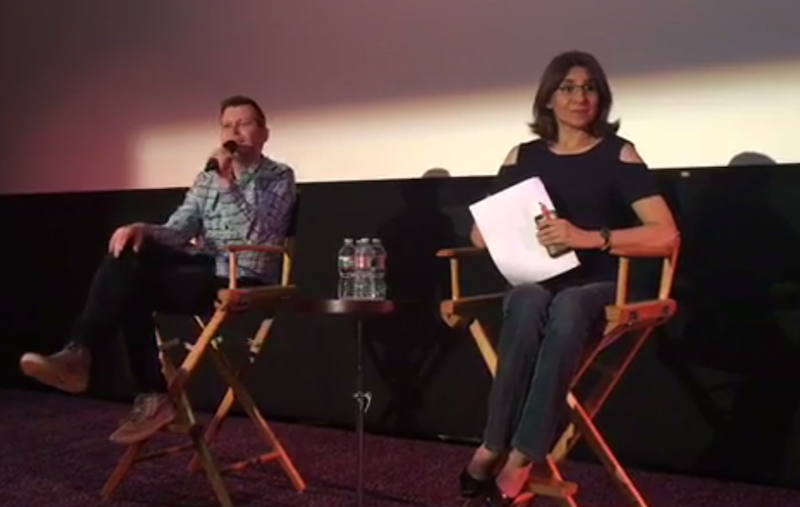
Baby Driver MPSE Sound Advice Event with Julian Slater and Carolyn Giardina
While Both M.P.S.E. and C.A.S. both have a number of international members, if you happen to be located in the U.K., I would also consider checking out The Association of Motion Picture Sound (A.M.P.S.). Much like M.P.S.E. and C.A.S., they host regular events for their members and give out awards recognizing accomplishments in sound. They also have a members’ directory to help you connect with other post professionals in the U.K. and a mentorship program for people looking to advance their careers.
4. Attend a conference or networking event in L.A.

This last October, myself and fellow Austin-based mixer Glenn Eanes made the trip out to L.A. from Austin to attend the Mix Sound for Film & TV event taking place on the Sony Pictures lot.
While attending an event like Mix Sound for Film & TV probably won’t land you a job or introduce you to new clients, it will let you spend a day with some of the industry’s top sound professionals. This was hands down one of the best learning experiences for me personally as a sound professional working outside of the L.A. system. Topics vary from year to year, but they typically cover a wide range of subjects with the sound teams behind each year’s biggest films. There is also enough time built into each day to network with other attendees. I also had a chance to talk to the teams at Avid and Dolby to discuss the details of our current studio here at Soularity upgrading to Atmos and get direct answers from the people creating the technology I use on a daily basis. When else can you sit down for hands-on training with Jeff Komar of Avid on one of the world’s largest S6 consoles?
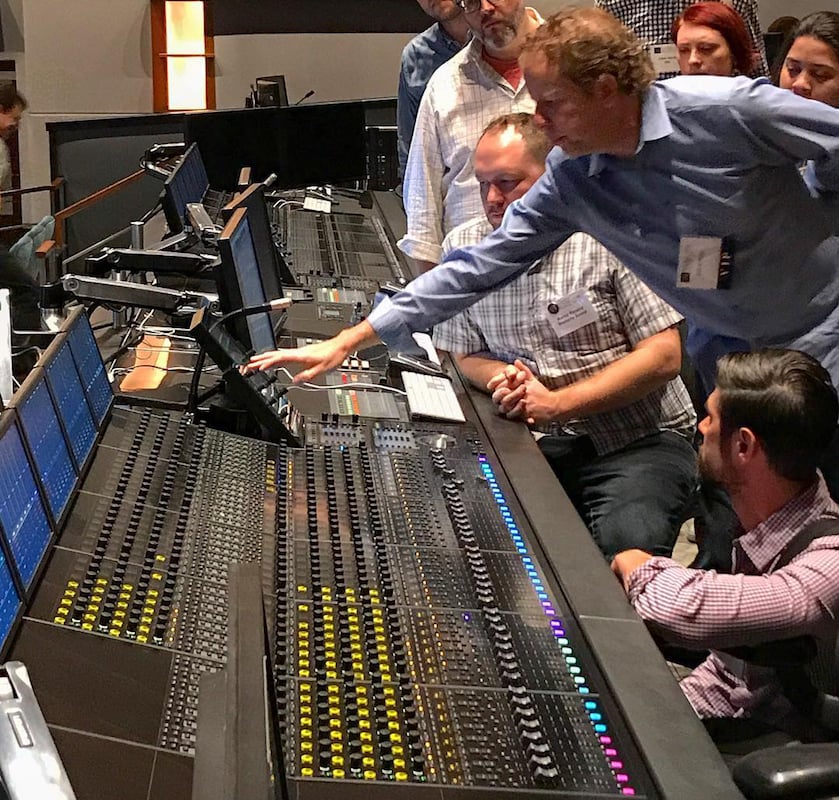 Korey and Glenn in the Carey Grant Theatre for S6 training with Jeff Komar of Avid. Photo Credit: David Bondelevitch
Korey and Glenn in the Carey Grant Theatre for S6 training with Jeff Komar of Avid. Photo Credit: David Bondelevitch
However, if you can’t make it out to an event like this in L.A., see what is happening closer to home. The Audio Engineering Society (A.E.S.) has a number of local chapters. I personally attended a meeting of the AES Central Texas Section and had the chance to network with a number of other audio professionals I had previously never met. Glenn Eanes and myself worked with one of their members, Aaron Brown, and set up an AES event at the studio we work at together, Soundcrafter, to talk post sound.
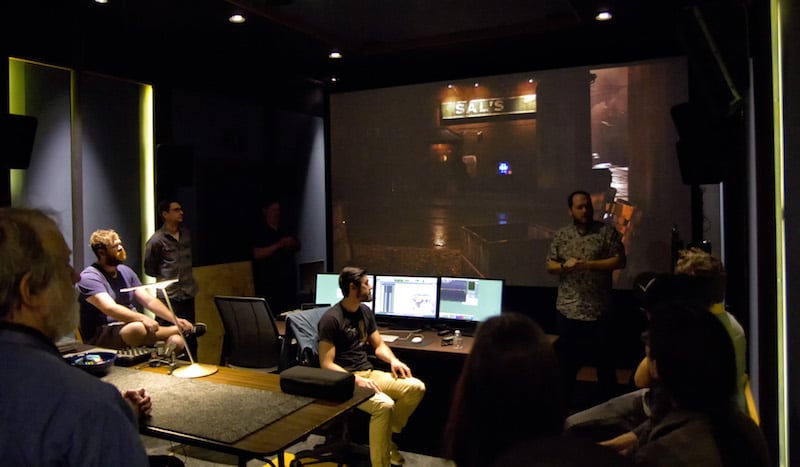
AES Central Texas Section meetup and tour at Soundcrafter. Photo Credit: Aaron Brown
If your city doesn’t have any local organizations like this, find out who else is working in post sound near you and try to set up an informal meetup at a local coffee shop or bar.
There are also a number of other conferences like NAB, GDC and IBC that can all be great networking environments as well. Just be sure to remember that the goal at conferences is to build contacts and not just secure a gig. Make connections but make sure you are focusing on genuine interactions and caring about the projects they are working on and what they have to say. The easiest way to turn someone off is by shoving your business card at them right away.
5. Use social media (to network)
Believe it or not, many of the top professionals in the film industry are active on either Twitter or Facebook and are pretty open to interacting with sound artists just starting out. While I won’t give you a list of people to follow on Twitter, look up who the sound teams are that work on your favorite films and start following them if they are on Twitter. If you ever have an insightful comment or answer to a question, feel free to chime in. Do NOT send unsolicited demo reels or resumes. Also, do NOT ask for a job. From time to time you will see people post or share job listings or ask for help. That is the exception.
On Facebook, there are a bunch of user groups that are focused on post sound. Here are a few of the ones I follow:
- Sound Design
- Post Sound Mixer
- Production & Post-Production Sound for Film/Video
- Motion Picture Sound Editors "walla" Group
- Field Recording
These are all great places to interact with other sound professionals. If you are just starting out, just reading through the previous discussions can give you a lot of great ideas. If you have specific questions, posting questions can be a great way to think yourself out of a problem. You will find that there are a number of regular posters in these groups, including some of the TOP professionals working in post sound. To this extent, when choosing to post to these pages, try to avoid posting any super easy questions that google can easily answer for you. At the same time, know that when trying to design a specific sound or talk through a particular issue, this can be a great resource to talk directly to other audio professionals you would not have access to in any other situation.
Final Thoughts
Building a network of filmmakers and producers and knowing what films are being made in your area is an important first step. Make sure these people know you exist and know you are interested in working on their next film.
Making a good impression with your fellow sound engineers can go just as far when it comes to generating work. We all get busy and will occasionally need an extra set of hands on a project or perhaps need to pass something off. Being in contact with the other audio shops in town and letting them know what you are capable of can put you on their list of people to bring on when they get busy or need to refer a client to someone else. If you don’t know who else is working in post sound near you, seek them out. Grab a coffee or a beer and find out what they are working on and have a conversation about workflow, workload, or gear.
Networking is hard and there is no clear path to success. The best thing you can do is make a good impression with the people you meet. Be proactive. If you are looking for work, make sure you have a demo reel or website ready to go. But more than anything, spend the time to make sure you are great at what you do and are ready to do the work when you land the next gig.
 Korey Pereira is the owner of Soularity Sound, based in Austin, Texas. He is an active member of the Motion Picture Sound Editors (M.P.S.E.) and a Lecturer at the University of Texas at Austin.
Korey Pereira is the owner of Soularity Sound, based in Austin, Texas. He is an active member of the Motion Picture Sound Editors (M.P.S.E.) and a Lecturer at the University of Texas at Austin.
Instagram: www.instagram.com/soularitysound
Twitter: www.twitter.com/SoularitySound



